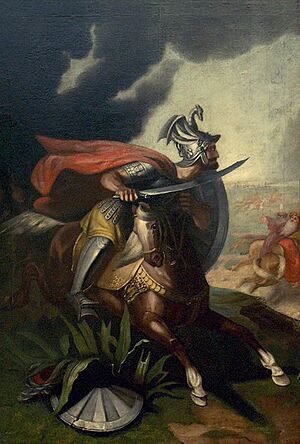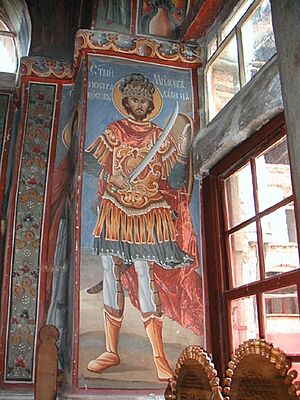Miloš Obilić facts for kids
Quick facts for kids
Miloš Obilić
Милош Обилић |
|
|---|---|

Painting by Aleksandar Dobrić, 1861
|
|
| Born | Unknown |
| Died | 28 June 1389 Kosovo field, District of Branković
|
| Occupation | Knight |
| Known for | the assassination of Murad I |
Miloš Obilić (Serbian Cyrillic: Милош Обилић) was a legendary Serbian knight. He is famous for supposedly serving Prince Lazar during the Ottoman invasion of Serbia in the late 1300s.
Miloš is not mentioned in records from his own time. But he became very famous in later stories about the 1389 Battle of Kosovo. In these stories, he is known for killing Sultan Murad. The story of Murad's killing spread quickly across the Balkans in different versions.
Even though his original name was Miloš Kobilić, many versions of his name appear in history. It is not certain if he was a real person. However, Prince Lazar's family helped create the "Kosovo Myth", which included the story of Obilić. He became a major hero in Serbian epic poetry. In these poems, he is seen as the most noble national hero of medieval Serbian folklore.
Miloš's brave act, along with Prince Lazar's martyrdom and the supposed betrayal by Vuk Branković, became a key part of Serbian traditions about the Battle of Kosovo. In the 1800s, Miloš also began to be honored as a saint in the Serbian Church.
Miloš is also remembered in Albanian epic poetry from Kosovo. There, he is known as Millosh Kopiliqi. His birthplace is said to be in the Drenica region, where villages named Kopiliq are located.
Contents
His Name
Miloš is a Slavic name that has been used since the early Middle Ages. It was common among Bulgarians, Czechs, Poles, and Serbs. The name comes from the Slavic word mil-, which means "merciful" or "dear." This root is found in many Slavic names.
Many versions of the hero's last name have been used throughout history. His first last name was Kobilić or Kobilović. This is supported by old records from 1433 in Ragusa. These records show his original last name was indeed Kobilić. In Albanian folklore, the original name is kept, and he is known as Kopiliq.
The name 'Kopiliq' might come from an old Balkan word. In Albanian, kopil means "child" or "illegitimate child." In Romanian, copil means "child." In Serbian, kopile means "illegitimate child," or kobila means "mare" (a female horse). Serbian folk stories say that Miloš was nursed by a mare, which links to the name kobila.
The name Obilić is now commonly used by Serbian writers. It first appeared in 1754 as Miloš Obilijević. Later, in 1765, it was written as Obilić. Some historians believe the name Obilić comes from Serbian words like obilan ("plenty of") and obilje ("wealth, abundance").
Miloš is often called "Miloš of Pocerje" in epic poems. Local legends say he came from the western Serbian region of Pocerina. In Pocerina, there is a spring called "Miloševa Banja" (Miloš's spring). There is also an old grave said to be his sister's grave.
Stories About Him
The earliest stories about the Battle of Kosovo do not mention Miloš or his killing of the sultan. The assassination itself was first recorded just 12 days after the battle, on July 9, 1389. The killing of Sultan Murad and one of his sons was also mentioned in Venetian records from July 23, 1389. However, the Venetians were not sure if the news was true.
On August 1, 1389, King Tvrtko I of Bosnia wrote a letter to Trogir to tell its people about the Ottoman defeat. A victory over the Turks was also reported by Coluccio Salutati, a leader from Florence, in a letter dated October 20, 1389. The killer is not named in these early accounts. He is described as one of twelve Christian noblemen who broke through the Ottoman lines.
The assassin first appears in Serbian stories in the 1440s. This was in the biography of Stefan Lazarević, Prince Lazar's son. The hero, still unnamed, is described as a noble man whom others tried to make look bad to the prince. To prove his loyalty and courage, he pretended to be a deserter. He then took the chance to stab the sultan to death and was killed soon after. This idea of proving loyalty through a brave act became a key part of the Serbian legend.
Ottoman sources also mentioned the sultan's death. One important Ottoman source from 1465 says that Miloš was a Muslim at the Sultan's court before he became a Serbian nobleman. This source claims Miloš left the Ottomans and gave up Islam. The Sultan supposedly asked him many times to return. According to this story, when Prince Lazar was captured, Miloš went to the Sultan. He said, "I am Miloš Ban, I want to go back to my Islamic faith and kiss your hand." When Miloš got close, he stabbed the Sultan with a hidden dagger. The Sultan's men then cut Miloš into pieces.
Since the late 1400s, Greek sources also started to record the event. A Greek scholar named Laonicus Chalcocondyles wrote that Murad's killer was Miloes. He was described as a noble man who decided to kill the sultan. He asked Prince Lazar for what he needed, then rode to Murad's camp pretending to be a deserter. Murad was eager to meet the deserter. Miloes reached the Sultan and his guards, then turned his spear against Murad and killed him.
Some historians believe that the ideas of secrecy and trickery in the Serbian story came from Turkish sources. They think this was done to make the Christian opponents look bad by saying Murad's death happened through "devious" (tricky) methods.
Oral Traditions
Serbian Stories
Miloš Obilić is a main hero of the Serbian legend of Kosovo. The most important part of this legend is the Battle of Kosovo. According to the legend, Miloš was married to Princess Jelena, who was the daughter of Prince Lazar.
A fight broke out between Miloš's wife and her sister, who was married to Vuk Branković. They argued about whose husband was braver. Because of this, Branković got angry and fought with Miloš. Filled with hate, Branković falsely told Prince Lazar that Miloš was secretly working with the Turks to betray the prince.
At Lazar's dinner the night before the battle, the prince accused Miloš of being disloyal. To prove his loyalty, Miloš went into the Turkish camp, pretending to be a deserter. At the right moment, he killed the Turkish Sultan Murad. The Sultan's guards then killed Miloš. The legend then continues to describe the events of the battle.
Albanian Stories
In Albanian epic poetry, the hero is known as Millosh Kopiliqi. This name is similar to his original name, Kobilić. He is believed to have been born in Kopiliq in the Drenica region. In most Albanian epic poems, Prince Lazar does not appear. Instead, Milosh Kopiliq, shown as a Christian Albanian warrior, is the only one who kills Sultan Murat.
In the Albanian story, after Murat's death, Milosh is betrayed by an old Slavic woman. He is then executed by the Ottomans. Some experts on Balkan epic poetry believe the story of Milos Kobilić is mainly an Albanian folk story. They think its main parts came from Albanian oral traditions.
His Legacy
Miloš was not honored as a saint in the Serbian Church until the early 1800s. During the Serbian Revolution (1804–1815), a painting of Miloš as a saint with a halo and a sword was made. This painting is in Prince Lazar's church at the Hilandar Monastery in Greece. Historians suggest that his worship as a saint started among Serbs living south of the Sava and Danube rivers during the Ottoman period.
Later in the 1800s, Miloš became even more of a national hero in the epic poem The Mountain Wreath (1847). This poem was written by Petar II Petrović-Njegoš, a prince-bishop of Montenegro. The poem praises Miloš's bravery in battle. Njegoš also created the Obilić medal for courage.
This event and the Battle of Kosovo itself became deeply important to the Serbs' national identity, history, and poetry. Njegoš's stories, including Miloš, inspired later generations of Serbs. One example is Gavrilo Princip, who assassinated Archduke Franz Ferdinand of Austria.
In 1913, the Medal of Miloš Obilić was given by King Peter I. It was awarded to soldiers for great personal courage, especially on the battlefield. It was given during the Balkan wars, World War I, and World War II. It was stopped when World War II ended.
In the late 1980s, Miloš and the Kosovo Myth became even more important. People were especially inspired by Njegoš's The Mountain Wreath. This poem showed Lazar as a Christ-like martyr and Obilić as a Serb who sacrificed himself to prove loyalty. A key event was the 600th anniversary of the Battle of Kosovo on June 28, 1989. This event was held at the Gazimestan plain, near the battle site.
Miloš's brave act has been mentioned in speeches by political leaders. For example, President Milošević spoke about him in his Gazimestan speech during the battle anniversary. His government often compared Milošević to Obilić, calling him the "savior of the nation."
Obilić is part of a Serbian saying: "Dva loša ubiše Miloša" or "Dva su loša ubila Miloša." This means "Two no-goods have killed Miloš." This saying means that sometimes quantity (many enemies) can win over quality (one brave hero).
In Serbian epic poetry, Miloš Obilić is often shown having "blood brotherhoods" (close friendships). He is linked with Milan Toplica and Ivan Kosančić, with Prince Marko, and with the Jugović brothers.
He is also included in The 100 most prominent Serbs.
See also
 In Spanish: Miloš Obilić para niños
In Spanish: Miloš Obilić para niños
- Battle of Kosovo
- List of Serbs
- History of Serbia
- Lazar of Serbia


